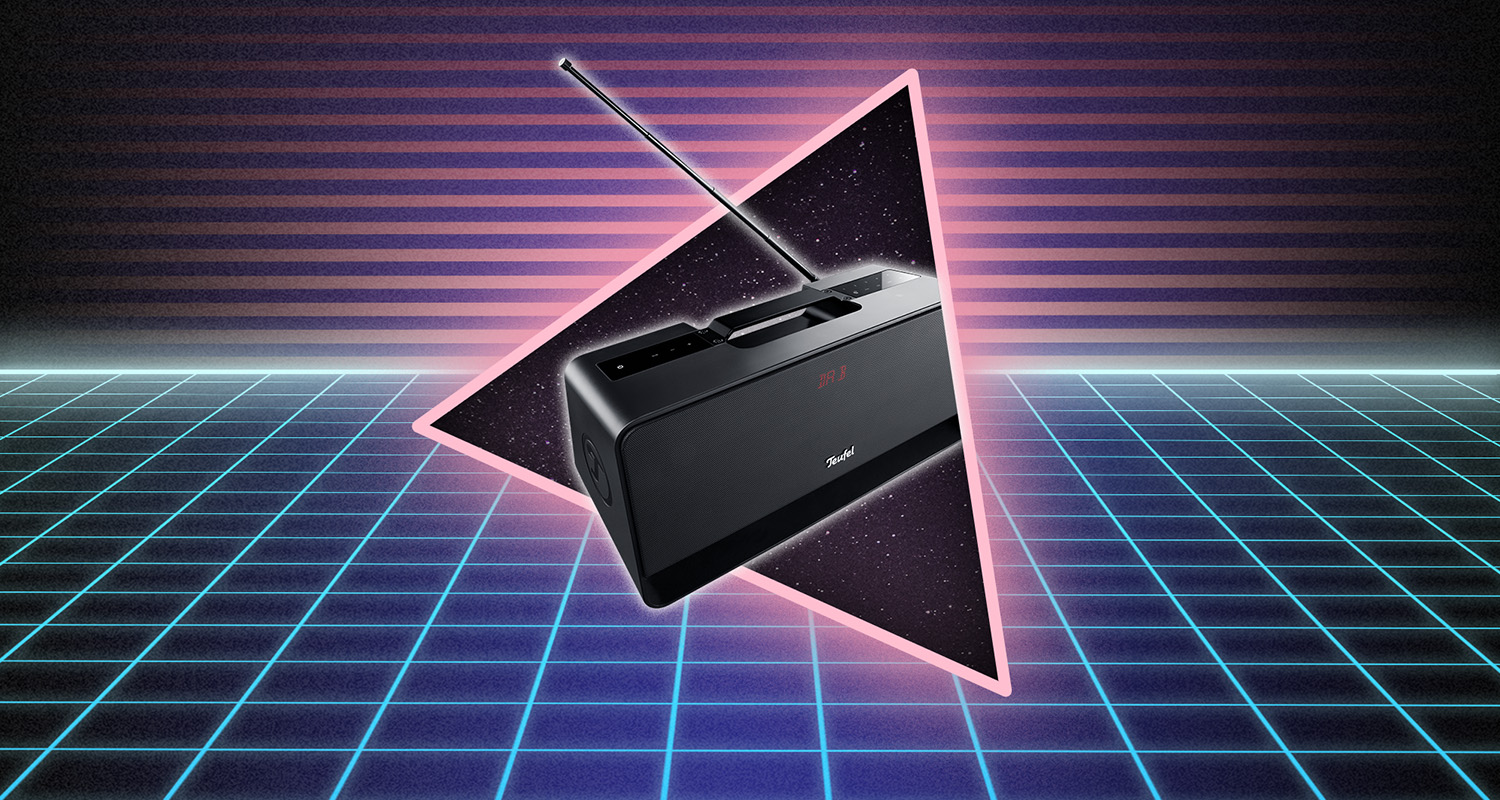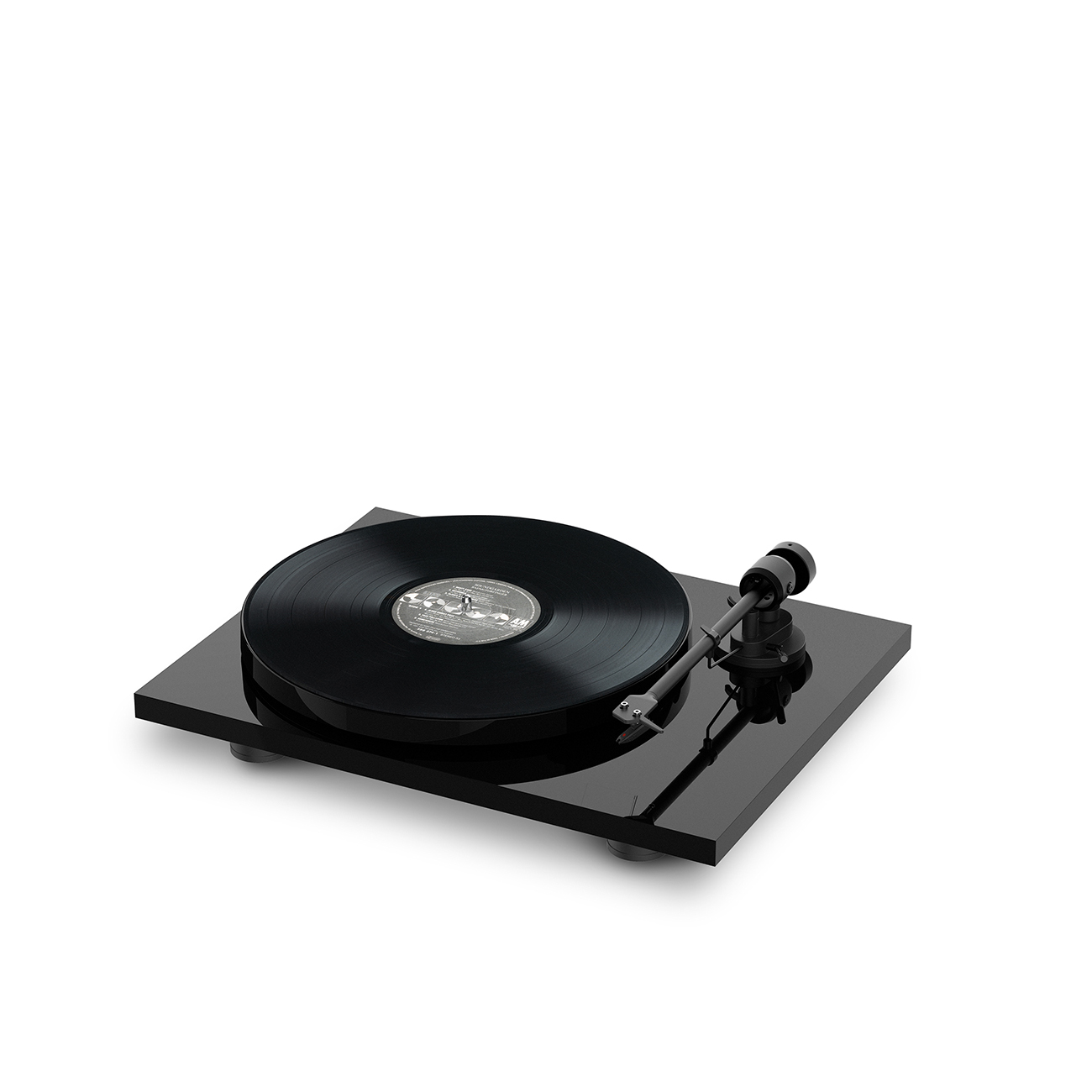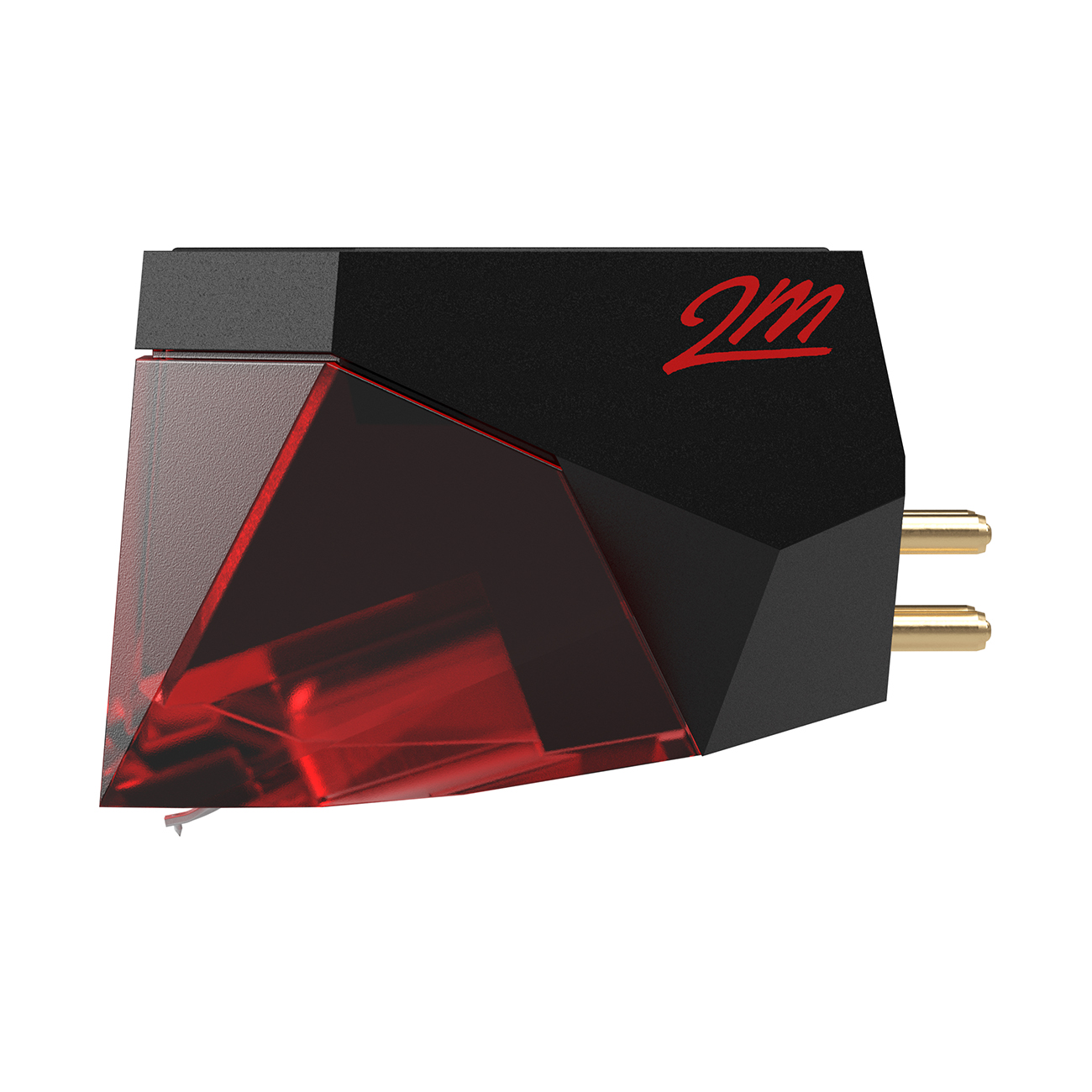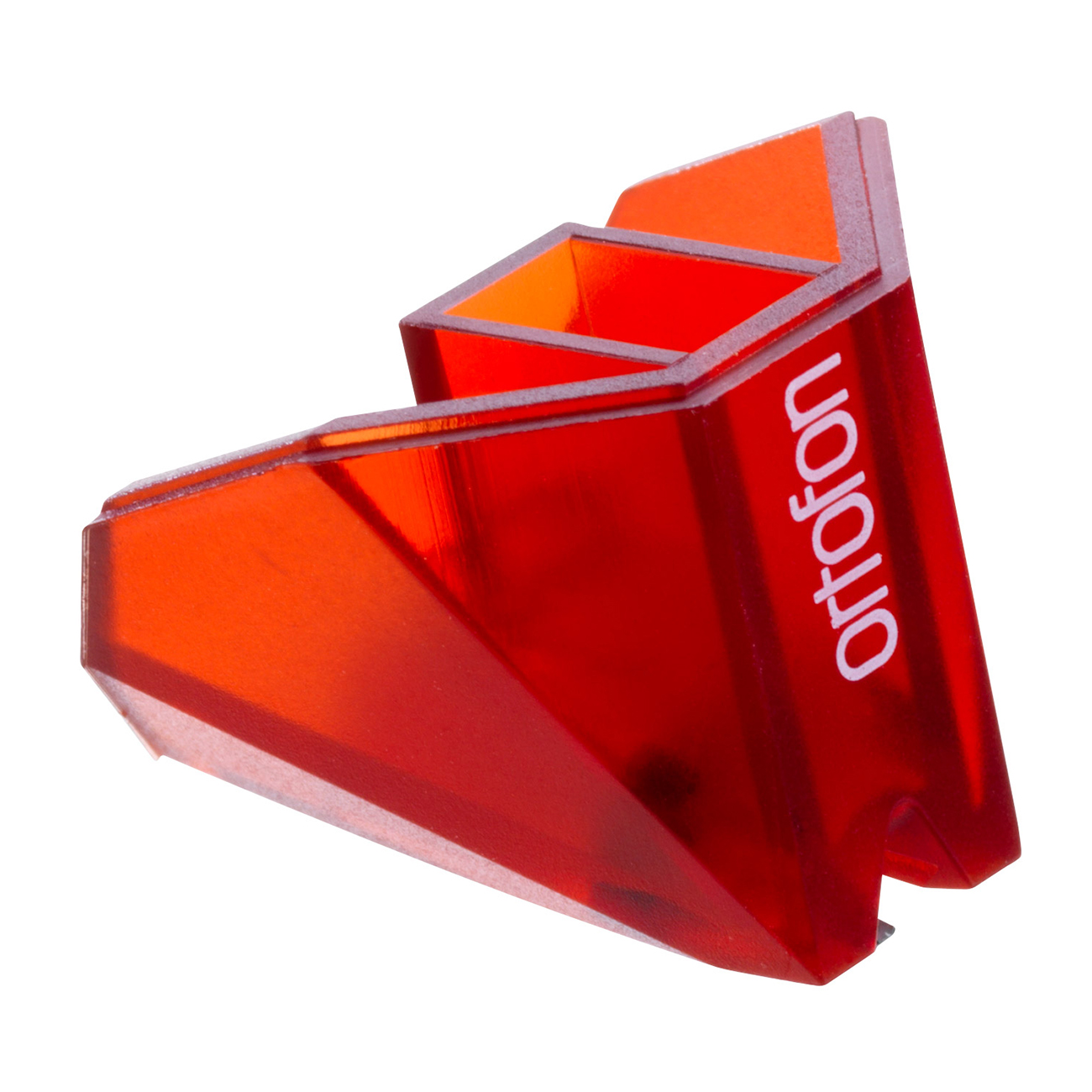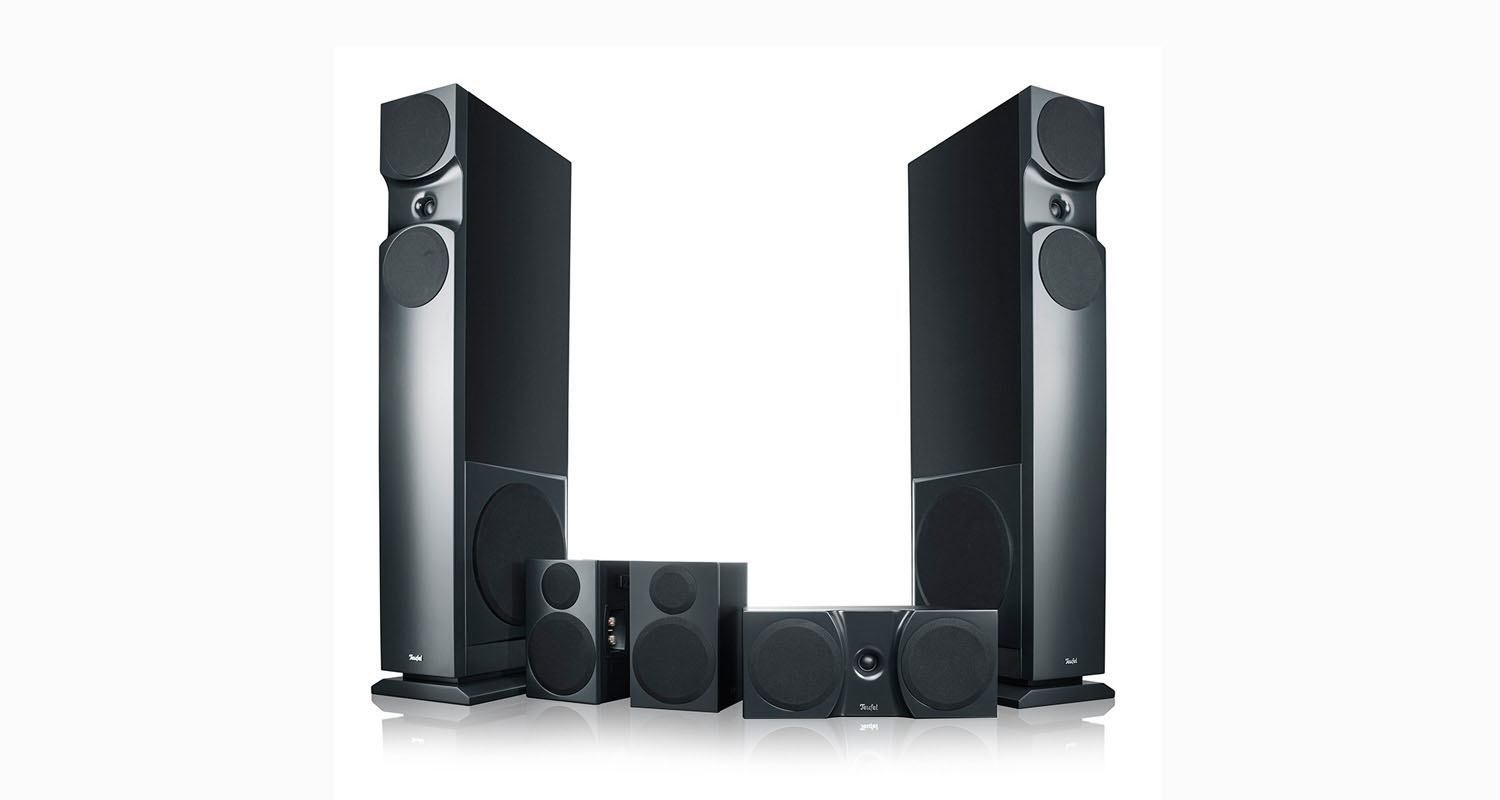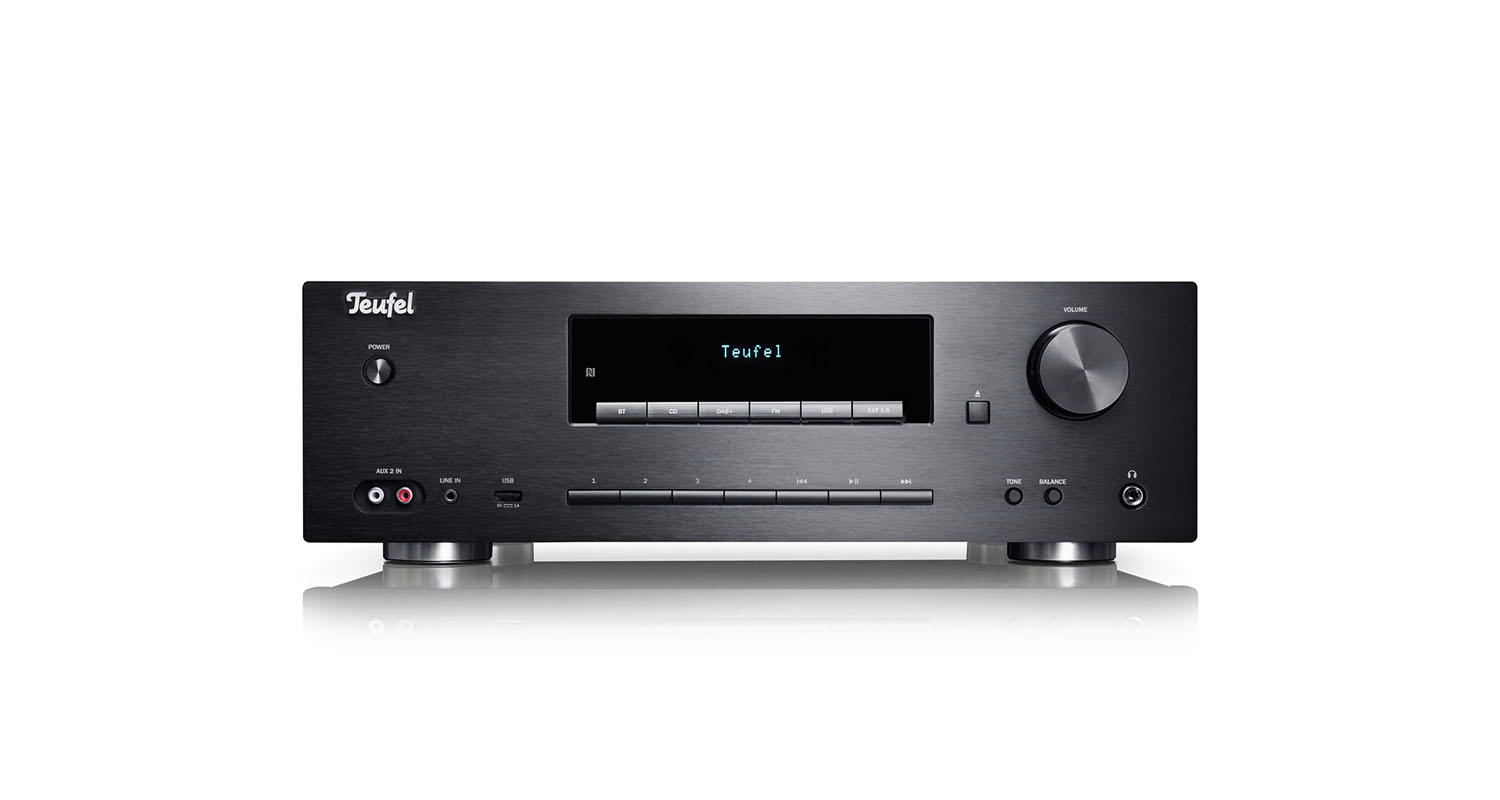To celebrate 45 years of Teufel, we take a look back at how the first speakers popped up in the living room. We’re also taking looking at the classic music hits that swept the nation and the films that we all loved. A real look back at the decade that saw the birth of Teufel.
The Music the 80s – from punk and new wave
Punk guitar riffs and bombastic rhymes: The music of the 80s is rich in contrasts. The political split of the Cold War and the threatening nuclear apocalypse shaped the zeitgeist of the decade, and many bands of the 80s responded with their own musical response. Some of them brought a clear message to the world situation in their songs. The party hedonists, on the other hand, preferred to dance to intoxicating disco sounds to the abyss. Still others discovered their melancholic side and struck a melancholic tone with New Wave. The range of musical currents and subcultures was seemingly wide. Whether punk, black power activist, popper, yuppie, hard rocker or new wave: everyone paid homage to a different style.

Neue Deutsche Welle
Drum machines, synthesizers and sequenced sounds established themselves in the 80s. Thanks to technical advances and lower acquisition costs, more and more bands experimented with electric sounds and added electronic gadgets to the classic line-up. Sound and lyrics of bands like Fehlfarben and DAF hit the nerve of the time and achieved international fame despite the German language.
The term Neue Deutsche Welle, often also called NDW for short, was coined analogously to the British New Wave. What began with punk-heavy sounds became more and more pop and even made use of typical hit elements, sometimes ironically alienated. From the mid-1980s onwards, practically all German-language hits received the label “NDW”. Unforgotten NDW hits of the 80s are Major Tom by Peter Schilling, Da da by Trio and of course Nena’s song about 99 balloons that triggered the Third World War – at that time a not unlikely story.
In East Germany the music of the 80s sounded different, but there are some stylistic parallels. Popular were elegiac songs like Battaillon D’Amour by the GDR combo Silly (at that time still with Tamara Danz) as well as subversive and rock-heavy songs, for example by Pankow.
New Wave and Synth-pop
The current emerged from punk and was a response to its radical slogans, overdriven amplifier dissonances and the minimalism of the three chords. In the early 80s more and more bands opened up to a more melodic sound, electronic sounds and elegiac lyrics. A milestone was the New Order song Blue Monday, which conquered the charts in 1983. Sometimes it was darker like Fade to Grey by Visage, sometimes more full of pathos like Vienna by Ultravox.
Depeche Mode also started their band career during these years and soon made their way towards New-Romantic and Synth-Pop. Synthesizers became style-defining for the music of the 80s. The often pre-programmed and similarly modulated tones created an unmistakable sound. Typical synth pop hits landed Soft Cell with Tainted Love and Alphaville with Big in Japan.
David Bowie proved to be a musical chameleon in the 80s. After an experimental creative phase he turned to New Wave and pop sounds. Maybe he was inspired by the Berlin club Linientreu, where he went in and out. The former disco in the Bikinihaus, today the headquarters of our flagship store, was considered a hotspot for New Wave, Electro and Pop. Right at the beginning of the decade he was successful with the single Ashes to Ashes. The visual tricks and cultivated artificiality of the video shaped the aesthetics of many video clips. Bowie remained a dazzling figure and trendsetter. The 1983 album Let’s Dance became his greatest success with the audience.
Techno beginnings
The house and techno scene, which was gradually crystallizing, was even more experimental. Electronic music is certainly not an invention of the 80s. But more and more musicians discovered bassdrum-heavy sounds, synthetic sound effects and alienated vocals. I’m the musician with the calculator in my hand was a line of songs by Kraftwerk in 1981, who liked to use new rhythm machines. They created the basis for techno, a term that established itself until the end of the eighties. The first Techno club opened at Frankfurt Airport in 1984 and the first Love Parade took place in 1989.
Hip-Hop and Punk: From Outsiders to the Establishment
At the beginning of the decade, punk was already an integral part of the music scene. More and more musicians split off and brought out either completely new or even more radical currents. The mainstream discovered punk in the mid 80s. Designers like Vivienne Westwood used “raw chics” and made leather jackets covered with rivets a fashion accessory. The punk queen Nina Hagen showed herself at a concert in Rio in 1985 in an outfit designed by Gaultier and became a style icon. Behind the Iron Curtain, however, the punk scene was still a subculture. Despite the restrictions of the GDR regime, however, every small town in the East soon had a punk band.
In the course of the 80s more and more graffiti made the cities more colourful and break dance made it onto the streets of the Federal Republic. With DJ-ing and speech singing, young Afro-Americans expressed their dissatisfaction with the hard life as outsiders of society in the ghettos of the USA at the beginning of the eighties. Scratching, phasing, backspinning, sampling and of course rap developed into unmistakable characteristics of hip hop. Their self-confident message “Black & Proud” was increasingly heard with virtuoso and rhythmic puns as well as verbal toughness.
Some of the former punk and rap outlaws soon achieved commercial success. The music industry devoted itself more and more to these phenomena and made them mainstream compatible.
Audio players with retro charm
80’s fashion hits and pop stars
Bright neon colors, lots of glamour, daring style mixes, XXL earrings and puffy blow-dry hairstyles: fashion dictates of the 80s were far away. Narrow pink aerobic body and washed-out jeans in carrot form, blazers with generous shoulder pads, leggings and tennis socks: everything was allowed, as long as it was colorful and glittering. The shrill looks completed the asymmetrical mullet cuts, voluminous perming and colorful Mohawk hairstyles.
The eighties were also a decade of pop icons. Stars like Madonna and Michael Jackson stormed the charts, were heard up and down on the record player and radio. Madonna’s lasting career began with her single Like a Virgin. Jackson’s album Thriller set new standards in 1982. The video for the song of the same name went beyond previous formats. The newly founded music station MTV broadcast it in an endless loop. Both pop stars picked up on fashion trends and set their own.
Films of the 80s: what was playing in the cinemas and on TVs?
Many films of the 80s are still cult today. Not only remakes and sequels of former blockbusters like Ghostbusters and Star Wars as well as the retro-chic of series like Stranger Things testify to this. New technical tricks produced effective action, sci-fi and fantasy films in the 80s. The star battle trilogy by director George Lucas even became part of pop culture. Characters like Luke Skywalker and Chewbacca still decorate many children’s rooms today.
Steven Spielberg conquered the hearts of the audience with E.T , a film about the friendship of a child with an odd but kind alien. Among the Hollywood romances of the 80s are the love comedy Harry and Sally, the drama Beyond Africa and the dance film Dirty Dancing. More for cineasts are the dystopian science fiction movie Blade Runner by Ridley Scott and Stanley Kubrick’s films of the 80s: Shining and Full Metal Jacket. Dallas and Denver, two-family sagas in soap opera format, kept viewers in suspense week after week, the sitcom Seinfeld kept them happy.
The 80s at Teufel: from expansion sets to the first speaker
Audio innovations and upgrades such as the music cassette expanded playback options and increased awareness of sound quality. No wonder that just at the beginning of the decade Peter Tschimmel founded the company Teufel.
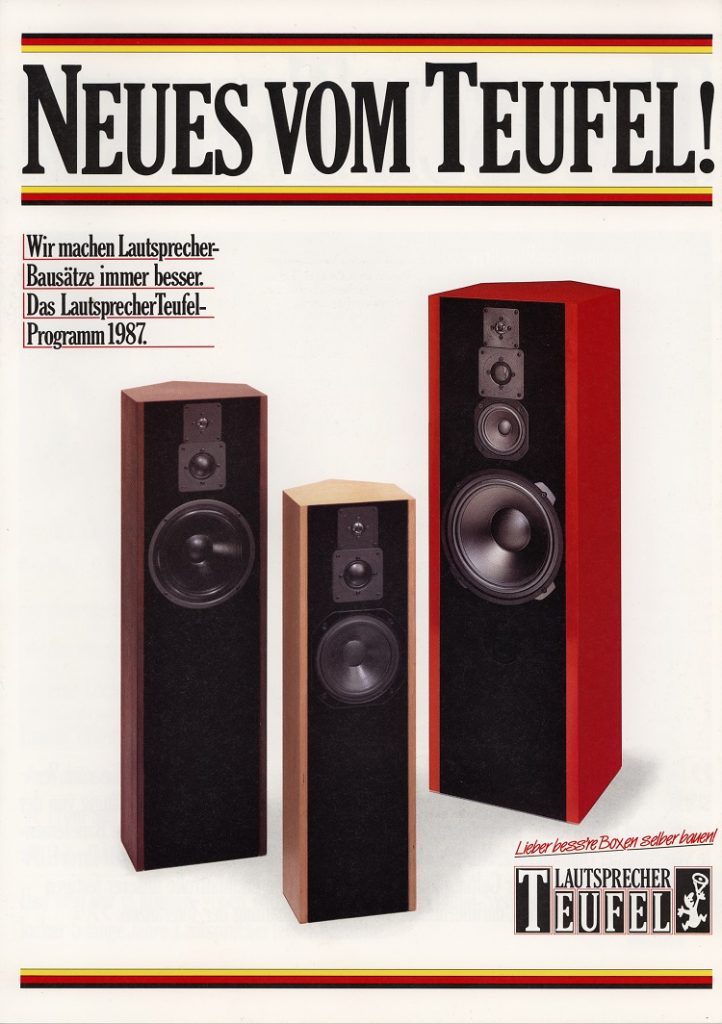
Especially audiophile customers liked our DIY kits, because Teufel kept his promise to make HiFi affordable. From then on, Teufel really got going, because the news spread from mouth to mouth in no time at all. By the way, Teufel was not only a pioneer in this field, because long before the Internet and online shopping were a thing of the past, but Teufel was also already selling his loudspeakers electronically. By e-mail order.
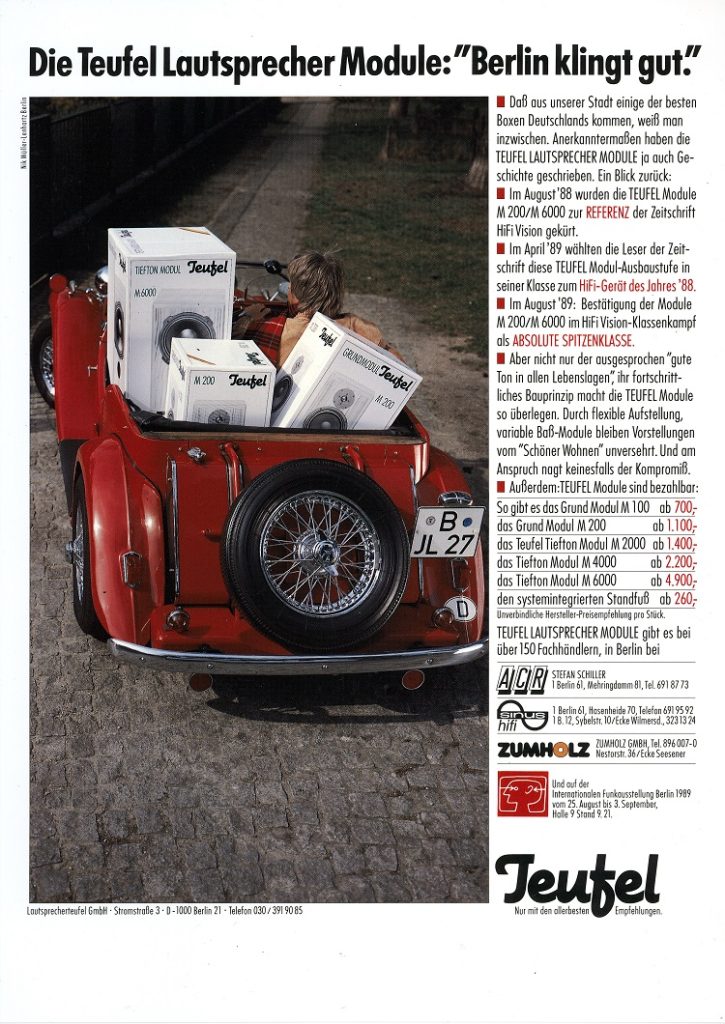
From 1988 Teufel produced the first complete boxes and set new standards with its two-channel model Teufel M 200. Whether from vinyl or music cassette, more and more music lovers played their bands of the 80s via Teufel speakers. Still today vinyl lovers swear by the “warm sound” as well as the crackling sounds of their black gold.
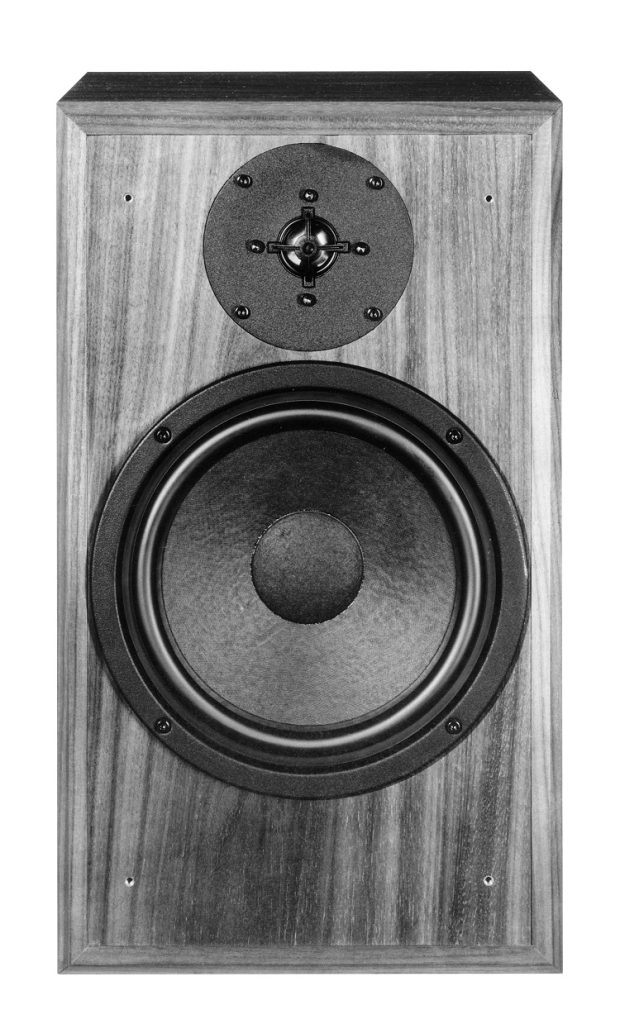
Walkman & Boombox: Music becomes portable
In the US, a new trend started to take hold – the boombox. In fact, the first models spread there as early as the end of the 70s. One of the first products in this genre was the JVC RC-838JW, which was released in 1978.
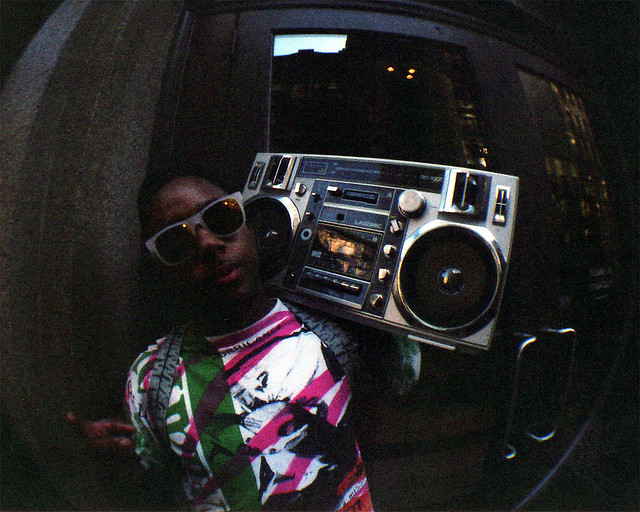
Also the victory march of the music cassette was inexorable in the eighties. One big feature was that users could record their own music with the tapes.

With a lot of patience and pressing the record button within seconds, she made it possible to record her own 80s hits on the radio. What today are the favorite lists of the streaming services were the self-created mixtapes. These could then be heard with another achievement from the eighties finally also on the way – the Walkman.
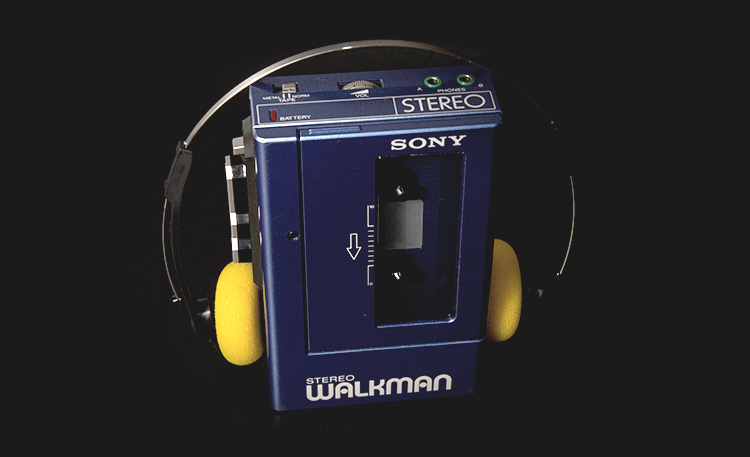
The Walkman in particular made the cassette the recording medium of the decade: thanks to Sony’s invention, music became portable. It marked the beginning of the age of headphones. From then on, music fans could listen to her songs anywhere and around the clock.

What to read next:
> 45 Years of Teufel part 2 – the 90’s
> 45 Years of Teufel part 3 – the New Millennium
> 45 Years of Teufel part 4 – the 2010’s to today
Fun facts from the 80s
- Only men love games? To overcome this cliché, the Japanese Tōru Iwatani created Pac-Man, who eats his way through the labyrinth and who should also appeal to women. He was right: The game design and new consoles like Atari VCS and Nintendo’s NES made Pac-Man one of the most popular games for both sexes in the eighties.
- From taboo word to everyday language: Rap songs were probably the most popular game in the USA in the 1980s. Always there: the rappers from N.W.A. counted concerned citizens: More than 200 times they used the frowned upon word “fuck” in their 1988 album.
- 5.55 seconds: This is the world record for the legendary magic cube with the colorful squares. Not only children, also adults broke their heads at this tricky toy.
- Why does Super Mario have a beard? Shigeru Miyamoto certainly didn’t think of an Italian plumber during his creation. The coarse pixels still limited the design possibilities at that time. A beard was added to give the face more individuality.
- Wide shoulders even without aerobics and a muscles: Those who weren’t blessed with muscle packed voluminous shoulder pads into jackets or blouses. For some, XXL shoulders were considered super masculine, for others they were ridiculously funny: “All he had was cotton wool”. But women also embraced the shoulder pad and thus created the image of the seasoned business woman.
Image 1: ©Chris Benso certain rights applyOpens in new tab. Source: UnsplashOpens in new tab
Image 2: ©Hello I’m Nik certain rights applyOpens in new tab. Source: UnsplashOpens in new tab
Image 3: ©Andy Li certain rights applyOpens in new tab. Source: UnsplashOpens in new tab
